Super User
Emerson’s Control System Update Helps Optimise Operations with Enhanced Flexibility and Connectivity
DeltaV distributed control system update features new PK Controller functionality for advanced physical layer and consumption-based deployments
Global technology and software leader Emerson is building upon the innovative technologies and solutions in the DeltaV™ distributed control system (DCS) with the release of DeltaV Version 15 Feature Pack 1. This feature pack release includes new technology and enhancements to current capabilities that not only improve control system situational awareness and performance, but also help ensure more efficient, sustainable operations.
Hybrid and process industry business drivers are continually changing as market dynamics shift product demand and costs. A modern, flexible control system is critical to help manufacturing sites and operations personnel adapt and drive productivity through seamless data connectivity and intuitive decision support applications. The latest release of the DeltaV control system continues the regular cadence between major DeltaV releases to help users more quickly realise the project savings and operational efficiencies that come with new features for their control system software.
“In an era of market volatility, increased focus on sustainability and few spare personnel, organisations are exploring automation projects that will expand their flexibility to help them stay nimble, making it easier to quickly deliver quantifiable value,” said Claudio Fayad, vice president of technology for Emerson’s process systems and solutions business. “Expanded connectivity and subscription options provide organisations the flexibility they need to design projects with very specific outcomes, measure the success quickly, and then make changes they need to rapidly bring return on investment in line with expectations.”
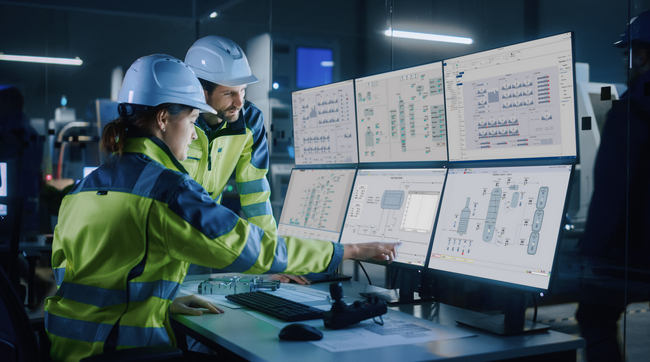 The release of DeltaV Version 15 Feature Pack 1 includes new technology and enhancements that offer greater flexibility and performance for more efficient, sustainable operations.
The release of DeltaV Version 15 Feature Pack 1 includes new technology and enhancements that offer greater flexibility and performance for more efficient, sustainable operations.
The DeltaV PK Controller line now includes built-in, native integration of PROFINET, further enhancing the wide variety of applications and system sizes addressed by the PK Controller line. With PROFINET capability, the PK Controller is now ready to integrate advanced physical layer (APL) devices, accelerating the adoption of high-speed devices in process environments. Additionally, the DeltaV PK Flex Controller is the newest addition to the line, adding flexible, software-defined control capacity that can scale and adjust as engineering or operational requirements change. Delivered as a subscription, the DeltaV PK Flex Controller reduces upfront cost, eliminates complexity associated with control engineering tasks and allows customers to easily adjust control capacity throughout the lifecycle of a facility.
The extensive suite of software applications that are core to the DeltaV system have also been enhanced in this feature pack, delivering more operational insights through robust analytics and intuitive operator environments. The newest version of DeltaV advanced control applications – Neural, Predict and Predict Pro – are now available in one-, three-, or five-year term-based licences, improving flexibility and reducing upfront investment, supporting a quicker return on investment.
In addition, improved integration of web applications further establishes DeltaV Live as the centre of a robust operational intelligence ecosystem providing a single, cohesive view of operations by securely integrating data, video streams, enterprise analytics and other decision support applications. This new capability adds to the existing set of high-performance tools in DeltaV Live to maximise situational awareness and deliver the ultimate operator experience.
To learn more, visit the DeltaV DCS Version 15 Feature Pack 1 webpage.
About Emerson
Emerson (NYSE: EMR) is a global technology and software company providing innovative solutions for the world’s essential industries. Through its leading automation portfolio, including its majority stake in AspenTech, Emerson helps hybrid, process and discrete manufacturers optimise operations, protect personnel, reduce emissions and achieve their sustainability goals. For more information, visit Emerson.com.
De Dietrich Process Systems Partners with Alysophil to Enhance its Expertise in Continuous Flow Chemistry
De Dietrich Process Systems is pleased to announce a strategic investment in Alysophil, a company specializing in AI-assisted continuous flow chemistry. This partnership marks a significant step for De Dietrich Process Systems in developing complementary technologies to batch production, traditionally based on the use of enamelled or alloy reactors. By investing in Alysophil, the group aims to expand its expertise in continuous flow chemistry, a growing field that has garnered considerable interest from numerous clients looking to establish new production units.
Continuous flow chemistry offers a host of undeniable advantages, including increased productivity, reduced space requirements, minimized operational risks, and simplified implementation. These benefits are increasingly attracting industries seeking to optimize their production processes and remain competitive in the global market.
Thanks to Alysophil's recognized skills and expertise in continuous flow chemistry, De Dietrich Process Systems will now be able to incorporate this innovative technology into select client projects. Alysophil's distinguishing factors in this market lie in the combination of continuous flow chemistry with artificial intelligence (AI) and the custom 3D printing of reactors, revolutionizing the approach to chemical synthesis. This technological convergence enables real-time optimization of chemical reactions through AI while personalizing reactors through 3D printing.

"With our Pharma & Green Solutions Business Unit, we aim to make a significant contribution to local, frugal, and safe chemical production in France, Europe, and the USA, tailored to specific needs, especially in the fields of pharmaceuticals, cosmetic ingredients, biosourced products, etc. We share this ambition with Alysophil, and we are thrilled to combine our expertise in this direction from now on."
- Frédéric Guichard, Director of Business Development, De Dietrich Process Systems
"Alysophil's ambition, since its establishment in 2018, has been to offer new solutions for molecule development and production using continuous flow chemistry and AI technologies. To provide an industrial tool, named Chempocket, we needed to find a partner who complemented our skills and shared the same vision. De Dietrich Process Systems fits the bill. This alliance means a lot to the entire Alysophil team, and we are eager to see what the future holds."
- Philippe Robin, CEO of Alysophil
De Dietrich Process Systems and Alysophil are committed to continuing their close collaboration to develop cutting-edge technologies, promote operational excellence, and offer innovative solutions that address the challenges of the modern chemical industry.
About De Dietrich Process Systems:
De Dietrich Process Systems is a major player in the design and manufacture of process equipment for the chemical, pharmaceutical, and agri-food industries. With 340 years of experience, the group offers comprehensive and customized solutions to meet the specific needs of its clients worldwide.
About Alysophil:
Alysophil specialises in continuous flow chemistry. It develops innovative technologies to optimize its clients' production processes, allowing them to benefit from enhanced performance while minimizing operational risks.
Metso awarded contract to deliver MP800TM cone crushers for an Australian iron ore mine
BHP has awarded Metso an order for three high-capacity Nordberg® MP Series™ cone crushers to be installed at its Whaleback mine in Western Australia. This order is booked in the Minerals segment’s third-quarter 2023 orders received.
“The MP800™ cone crushers will replace the long-serving MP cone crushers. The robust and high-capacity MP Series crushers are a step change in the crushing process, enabling maximum operator safety and easy maintenance, as the key components can be accessed from the top of the crushers. They provide a more sustainable solution, delivering high crushing force with relatively low energy consumption,” explains Vinicius Vilela, Vice President, Mining Crushers at Metso.
 Metso’s cone crusher offering includes four product families for different applications and operations. The Nordberg® MP Series™ cone crushers feature high capacity and high crushing force for size reduction with good energy efficiency. In addition, Metso has a wide offering of cone crusher spare and wear parts and services to enable stable production, safety, and reliability without unexpected downtime.
Metso’s cone crusher offering includes four product families for different applications and operations. The Nordberg® MP Series™ cone crushers feature high capacity and high crushing force for size reduction with good energy efficiency. In addition, Metso has a wide offering of cone crusher spare and wear parts and services to enable stable production, safety, and reliability without unexpected downtime.
Read more about MP Series™ cone crushers on our website.
Further information:
Kai Rönnberg, Vice President, Minerals Sales, Asia Pacific, Metso, tel. +61 407 020 306, email: kai.ronnberg(at)mogroup.com
Helena Marjaranta, Vice President, Communications and Brand, Metso, tel. +358 20 484 3212, email: helena.marjaranta(at)mogroup.com
Metso is a frontrunner in providing sustainable technologies, end-to-end solutions and services for the aggregates, minerals processing and metals refining industries globally. By helping our customers increase their productivity, improve their energy and water efficiency and environmental performance with our process and product expertise, we are the partner for positive change.
KiwiRail selects VIKING’s innovative electric LifeCraft™ powered by Torqeedo.
Revolutionary evacuation system is half lifeboat, half liferaft, and 100% electric
More than 800,000 people take the famous and beautiful Interislander ferry route between New Zealand’s North and South Island every year. In future, with the arrival of two new diesel hybrid-electric ferries in 2025, they will be fitted with state-of-the-art lifesaving equipment as they cross the Cook Strait. In an industry first, the revolutionary VIKING LifeCraft™ was recently selected to protect KiwiRail’s new 1900-passenger, hybrid-electric interislander ferries. Torqeedo supplies the high-thrust electric propulsion system for the survival craft, which is designed to be ultra-compact, require minimal maintenance, and ensure the safe evacuation of hundreds of passengers from ships at sea.
Traditional lifeboats with combustion engines take up valuable space onboard and will likely never be used over the entire lifetime of the vessel, but they must be ready to go at a moment’s notice. This requires frequent safety checks, drills and maintenance. The 203-passenger LifeCraft is a motorized inflatable vessel with a passenger chute system and advanced battery-electric propulsion, designed to deploy from a compact and lightweight shipboard storage/launch station.
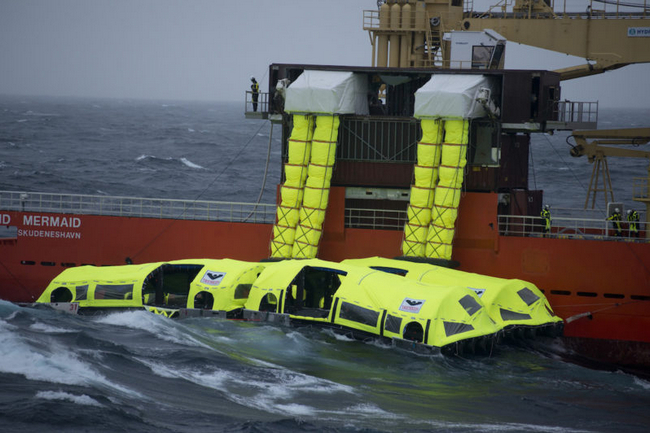
Electric drives were specified because they are ultra-reliable and don’t require frequent access to fuel, oil and ignition systems for maintenance or for pre-departure safety checks. The crew can check the system’s readiness at the touch of a button, right from the bridge. Each LifeCraft’s propulsion package consists of four Cruise electric pod drives powered by Power 24-3500 lithium-ion batteries. One motor is installed at each corner of the boat for redundancy and maneuverability.
“With four LifeCraft in each system, we save space onboard, deliver superior manoeuvrability, and can evacuate more than 800 people within 30 minutes,” said Niels Fraende, VIKING’s vice president of sales for Cruise & LifeCraft. “The LifeCraft eliminates dangerous lifeboat drills and can also be used to perform search and rescue operations if another vessel in the area requires support, boosting passenger and crew safety in the Cook Strait as a whole.”
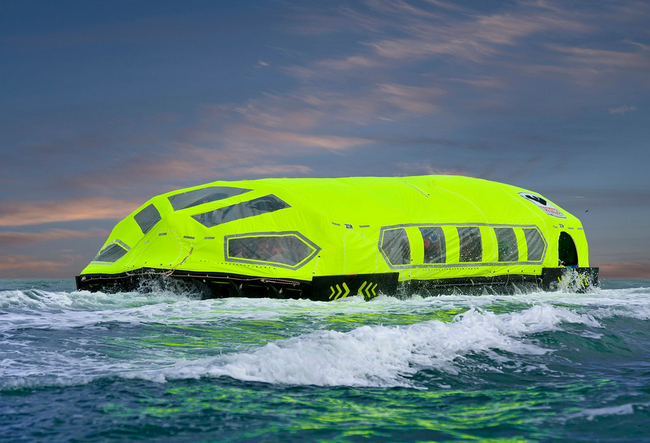
“VIKING’s LifeCraft is truly innovative and so is its electric drive system, which must deliver the highest reliability. The Torqeedo team has enjoyed participating in the LifeCraft’s development, and we’re thrilled to see its first implementation in KiwiRail’s new ferries,” said Fabian Bez, CEO of Torqeedo GmbH. “Torqeedo’s electric drives enable all sorts of next-generation tech, from foiling speedboats to large sailing yachts and lifesaving equipment. Congratulations to all involved in this industry first.”
About Torqeedo:
Torqeedo is the market leader for electric mobility on the water. Founded in 2005 in Starnberg, the company develops and manufactures electric and hybrid drives from 0.5 to 100 kW for commercial applications and recreational use. Torqeedo products are characterized by an uncompromising high-tech focus, maximum efficiency and complete system integration. Torqeedo is part of DEUTZ Group, one of the world's leading manufacturers of innovative drive systems. www.torqeedo.com
About VIKING:
VIKING Life-Saving Equipment is a global market leader in maritime and offshore safety. Headquartered in Denmark, the corporation manufactures, supplies and services everything from chute and slide-based evacuation systems to liferafts, lifejackets, immersion suits, firefighting equipment, aviation safety gear, lifeboats, hooks, davits and more. In 2018, VIKING acquired Norsafe, the Norwegian boatbuilder whose lifeboats are used throughout the world, adding further strength to an unmatched product and service offering in the global maritime safety industry.
Founded in 1960, the privately held corporation manufactures in Denmark, Norway, Bulgaria, Greece, China and Thailand, and provides safety solutions in all significant markets and locations.
www.VIKING-life.com
Advanced Engineering partners with The CPD Group
Log CPD points when attending talks across Advanced Engineering’s five forums
For the first time, attendees at Advanced Engineering 2023 will receive accreditation from The CPD Group. The CPD Group, based in the United Kingdom, is recognised as one of the fastest growing continuous professional development (CPD) accreditation services worldwide. Advanced Engineering is taking place at the NEC, Birmingham on November 1 and 2 and will host over 150 industry-leading speakers across its forums, all of which can be accessed with a visitor pass.
There are five forums at Advanced Engineering offering hours of informative and engaging content, all of which count towards attendees’ CPD. The main stage, which is new for 2023, is a one-stop-shop for information on the latest industry developments, government policy and inspiring keynotes.
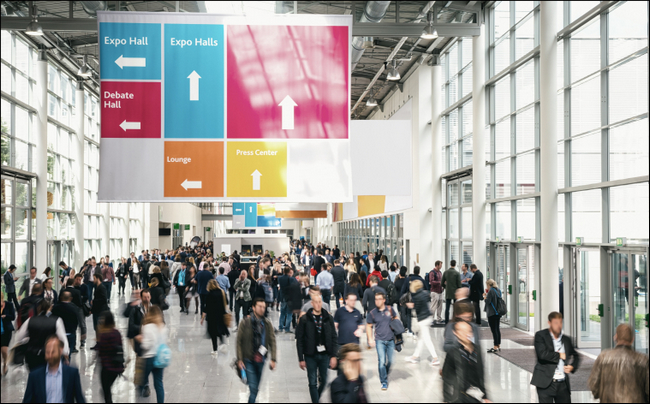
The composites forum, which is supported by Composites UK, will cover topics such as new composite materials, lightweighting and made-for-purpose materials. Discussions on the aerospace forum, supported by ADS, will explore the latest developments in electric vertical take-off and landing (eVTOL), urban air mobility, space, in-orbit manufacture and hydrogen fuel. Finally, the automotive forum, supported by the Society of Motor Manufacturers (SMMT), will uncover the latest developments in lightweighting, electronics and future fuels. There will be case studies from key original equipment manufacturers (OEMs) and tier one suppliers.
“This year, Advanced Engineering will host representatives from some of the leading engineering and manufacturing firms as speakers across its forums,” explained Simon Farnfield, event director for Advanced Engineering. “This includes keynote talks from Richard Noble OBE, former holder of the World Land Speed Record and serial innovator at ThrustWSH. We’ll also welcome Stephen Phipson OBE, CEO of Make UK. Our partnership with The CPD Group means that, as well as being able to enjoy talks, panel discussions and more from industry leaders like Noble and Phipson, attendees will be able to log their attendance as part of their CPD plans.”
To obtain the certification, Advanced Engineering attendees simply need to scan the QR code at the exit of every forum, provide their name and email address and they will receive their certificate by email. All forums can be accessed for free with an exhibitor or visitor pass for Advanced Engineering. To register, visit www.advancedengineeringuk.com.
ATS: the heating, sensing and controlling suite of tomorrow
In the past, thermal systems always had trade-offs that often made the “ideal” system out of reach. Whether budgetary concerns limit the number of temperature sensors, tight space requirements restrict the number of zones or the technology hampers how precise the heating systems are, these systems are often curated with compromise. Here, Sean Wilkinson, Product Manager at industrial technology company Watlow, explores how adaptive thermal systems (ATS) are designed to provide companies with the tools to build the heating systems they need, without forcing compromise.
A great heating system needs a great controller. Of course, better controllers are only worth the investment if it’s possible to achieve better control throughout the system. Improved control requires more sensors, which can be a costly proposition.
But there are ways to get around high costs. High temperature coefficient resistance (TCR) materials respond to temperature changes with a change in resistance. By measuring that change, it’s possible to determine the temperature at that location. Building heaters out of high TCR materials adds a sensing capability, adding measurements to places where they were previously impossible due to space or cost requirements.
Likewise, integrated thermocouple heater (TCH) junction temperature control turns heater power leads into a thermocouple junction. The voltage at this junction varies consistently with the surrounding temperature, so measuring it provides a spot measurement of the temperature at that location. Together, these two technologies offer expanded sensing options without additional wiring or extra controllers.
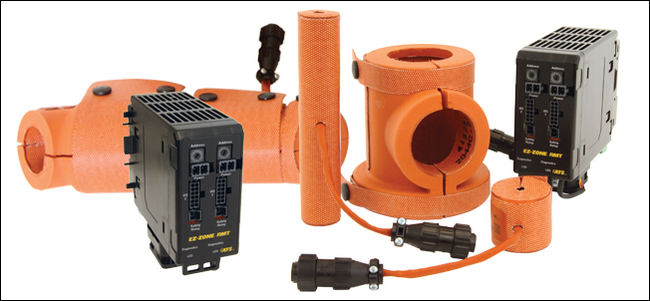
Multi-loop control and sensing
Adopting high TCR materials or TCH junction temperature control can lead to an abundance of available data, which can be used to fine-tune processes and operating costs. However, in other systems, the increased capabilities would lead to an exponential increase in necessary wiring, which may not be possible due to space or budgetary requirements.
Watlow, which manufactures industrial heating technology, has decades of experience with thermal systems to help engineers and designers to incorporate ATS technology into a variety of industrial processes and products. Watlow’s multi-loop control uses a multiplex wiring scheme that enables as many as ten times the number of zones per wire when combined with high TCR materials. Increasing zone density allows for unparalleled sensing and control without creating budgetary issues.
Additionally, the company developed a standardised harness for the ATS system, which reduces the complexity of installations and the number of design passes needed before installation can begin.
The power of modularity
ATS’ true power comes from the fact that each system component is beneficial on its own, but together, they can transform a heating process from end to end. Whether designing a system from scratch or redesigning one that has not quite lived up to expectations, ATS brings something new to the table.
Many thermal system design projects reinvent the wheel at each stage of the process. ATS’s modular “off-the-shelf” approach to many components not only lowers cost, but also reduces the number of design iterations needed before implementation to reduce lead time.
However, it is essential to remember that ATS is still customised to the exact needs of each application. Due to that, it represents the best of both worlds. A system that can deliver the accurate temperature control needed for modern manufacturing while avoiding compromises related to cost, space, sensor density and heating control accuracy that other systems face.
ATS is a suite of solutions that can be tailored to specific engineering challenges, and without compromise as previously experienced. Now, ATS’s controllers, heating elements and sensors can help companies achieve breakthroughs in cost, efficiency, precision and data production, which can be used to help drive the next generation of growth within various manufacturing applications.
About Watlow:
Founded in 1922, Watlow strives to be the leading provider of thermal solutions for the world’s most demanding applications. Utilizing our advanced technology, leading companies apply our thermal systems which are ideally suited for vital applications such as clean and environmentally-friendly energy systems and processes, front-end semiconductor processing and lifesaving medical and clinical equipment. Since 1922, Watlow has grown in product capability, market experience and global reach. The company holds more than 1,100 patents and employs 6,000 team members working in 12 manufacturing facilities and five advanced technology and development centers in the United States, Mexico, Europe and Asia. Watlow covers 95 countries through sales and distribution offices around the world. The company continues to grow, while the commitment remains the same – to provide its customers with superior products and services for their individual needs.
In-Comm Training enjoys record 199 engineering apprentice recruitment drive as vocational learning on the rise
Interest in engineering apprentices is booming in the West Midlands after In-Comm Training announced a 35% increase in the number of starts this September.
One of the UK’s leading training providers has recruited 199 individuals across its Aldridge and Telford technical academies, with learners starting their careers in machining, robotics, welding, electrical, mechatronics and toolmaking.
Companies, including Ansaldo Nuclear, Altrad Babcock, HS Marston Aerospace, Magna Cosma Castings, Makita, RBSL and Veolia, are taking the long-term approach to beating the current labour and skills shortage by opting to grow their own.
In addition to the budding engineers of the future, In-Comm Training also successfully inducted 25 learners onto its Level 4 HNC programme - highlighting a strong move towards upskilling workers.
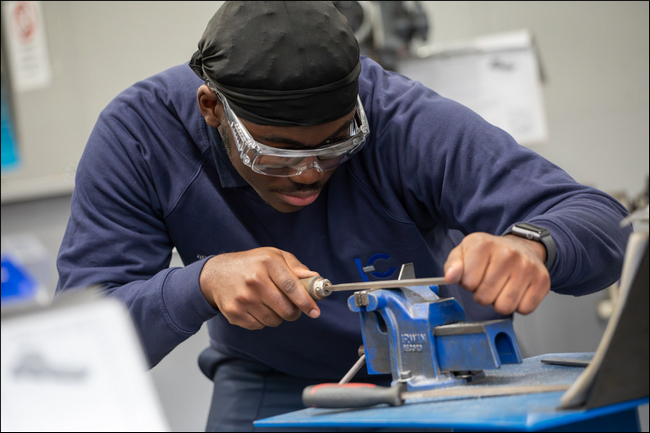
Paul Hodgetts, Business Development Manager at In-Comm Training, commented: “We have been able to fill nearly 90 additional vacancies this year, which is great news for local employers and a massive indication that vocational learning is in the ascendancy.
“There is a lot of opportunity for industry at the moment, but the ability to scale up is being held back by access to both the right people and the volume of individuals in the labour pool.”
He continued: “The results of our Training Barometer clearly showed that industry was waking up to the importance of developing their own staff and apprenticeships now being accepted as a credible career development choice.”
“In-Comm has also had a big drive on equality and diversity, making sure industry is seen as a career for all. This is paying off with 30% of our new Telford cohort girls and nearly 19% of our Aldridge learners coming from a Black, Asian and Minority Ethnic background. The latter is an impressive stat when you consider the national average for engineering is just 7%.”
The first cohort of learners have already started at both sites, with the second one set to begin shortly.
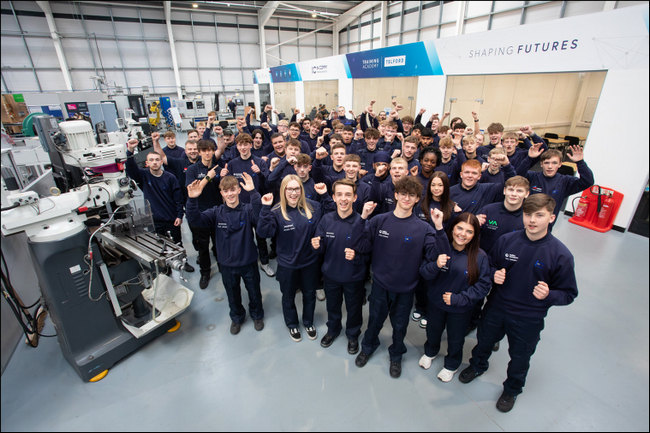
Apprentices will go through a 1-week induction to their specific programme before progressing into workshops that blend theory with practical training on manual and CNC machines, and over £10m of metrology, CAD, fluid power, robotics and wire EDM capabilities.
Depending on their pathway, they will be either full-time at In-Comm or part time and spending the rest of the course at their employers, gaining experience and knowledge from work-based mentors.
Jayne Guest, Recruitment Manager at In-Comm Training, concluded: “We will be continuing our recruitment of apprentices throughout the coming months for our early 2024 cohorts and then the big recruitment drive from Christmas kicks-off again - to fulfil our September and October 2024 starts.”
For information and to register your interest please visit www.in-comm.co.uk or check out the company’s socials.
StoreDot Signs Agreement with Flex|N|Gate to Produce XFC Battery Cells for US EV Market
StoreDot, the pioneer of extreme fast charging (XFC) battery technology for electric vehicles, has just announced that it has signed a strategic partnership agreement with Flex|N|Gate, a leading global automotive component manufacturer.
This landmark agreement will see both companies collaborate to sample and scale up the commercialization of StoreDot’s game-changing extreme fast charging battery cells for electric vehicles. Samples of StoreDot’s 100in5 battery cells will be produced next year at Flex|N|Gate Group’s “Flex-lon” lithium-ion cell pilot factory in Windsor, Ontario while working with local automotive OEMs to produce cells with specified performance and formats.
Amir Tirosh, StoreDot COO “This is an exciting and significant agreement which further supports and enhances our path to OEM commercialization. Working with Flex|N|Gate, a tier one manufacturer and global leader in mass-scale automotive component production, opens vast new opportunities for StoreDot in the North American market, including the ability to localize its cell production. The collaboration allows us to serve the needs of local OEMs, building upon our recently established California R&D facility.
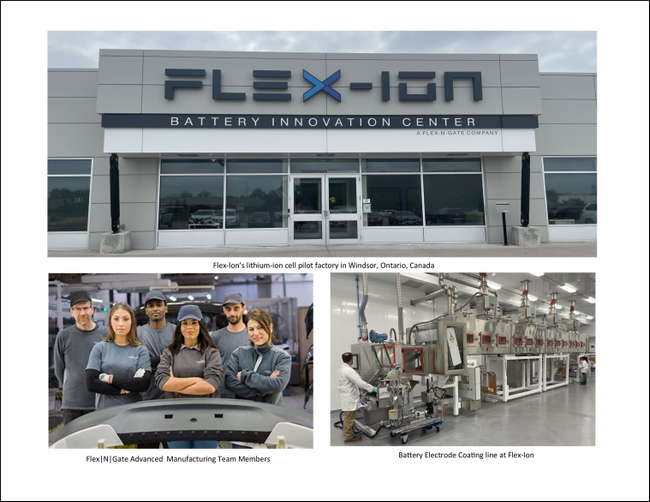
“Our 100in5 battery cells are already being tested by electric vehicle manufacturers; this strategic agreement gives us ability to scale up rapidly to mass production and flexibility to produce OEM li-ion battery cells at the scale and in the form factors required by this burgeoning industry. Enabling owners to charge their cars safely in minutes is no longer an option, as range and charging anxiety remain the main barriers for mass EV adoption.
“We look forward to a long and fruitful relationship with Flex|N|Gate as we roll out the XFC revolution together.”
Guido Benvenuto, Flex|N|Gate Vice President of Global Sales “We are honored and excited to collaborate with StoreDot, an acknowledged innovation leader in the EV battery space. Producing extreme fast charging battery cells at giga-scale is a key competitive requirement in the electric vehicle industry. Applying our mass production manufacturing expertise to StoreDot’s cutting-edge technologies will create an ideal framework to establish world-class cell manufacturing facilities. Early next year, cells will be produced at Flex-Ion’s pilot plant in Windsor, Ontario, where we have established the capacity and flexibility to service the needs of the automotive industry. This will be a significant and rewarding development as the Americas transition to electrified mobility.”
StoreDot's commitment to innovation and collaboration is being demonstrated through its rapidly growing global network of strategic partnerships with investors, leading OEMs, and manufacturing partners. Global automotive and EV manufacturers like Daimler, Ola Electric, Polestar, VinFast, and Volvo Cars are already key strategic partners of the company.
Recently StoreDot reported strong performance feedback for the evaluation and integration A-Samples testing phase of its XFC electric vehicle battery cells. The comprehensive testing programs took place earlier this year by 15 leading global automotive brand manufacturers from Europe, Asia, and the US, as well as several of StoreDot’s strategic ecosystem partners, with many now moving onto B sample and cell integration programs.
About StoreDot
StoreDot is the pioneer and leader of extreme fast charging (XFC) electric vehicle batteries that overcome the critical barriers to mainstream EV adoption – range and charging anxiety. The company has revolutionized the conventional Li-ion battery by innovating and synthesizing proprietary organic and inorganic compounds, optimized by Artificial Intelligence algorithms, enabling to charge an EV in under 10 minutes – the same experience as refuelling a conventional combustion engine car.
Through its '100inX' product roadmap, StoreDot's battery technology is delivering ‘Range on DemandTM’: 100 miles charged in 5 minutes in 2024, 100 miles charged in 3 minutes by 2028, and extreme energy density solution enabling 100 miles charged in 2 minutes by 2032. StoreDot's strategic investors and partners include BP, Daimler, VinFast, Volvo Cars, Polestar, Ola Electric, Samsung, TDK, and its manufacturing partner EVE Energy. In 2022, the company achieved a world first by demonstrating a live extreme fast charging of an EV battery cell in 10 minutes. StoreDot is on target for mass production readiness of 100in5 technology by 2025.
About Flex|N|Gate Group
Privately held Flex|N|Gate Group (www.flex-n-gate.com ), is controlled American industrialist Mr Shahid Rafiq Khan (https://en.wikipedia.org/wiki/Shahid_Khan ) The Flex|N|Gate Group is a leading manufacturer and supplier of parts, components, sub-systems and systems for the automotive industry with a global platform of seventy-seven(77) integrated manufacturing, product development and advanced product engineering facilities. The group employs a global team of over 26,000 individuals. Founded in 1956, it ranked as one of America's Best Large Employers by Forbes magazine in both 2021 and 2022. Flex|N|Gate Group companies operate facilities in the United States, Canada, México, Spain, France, Italy, Germany, the United Kingdom, China, and Argentina. Flex-N-Gate’s headquarters are located in the United States.”
Flex|N|Gate Group products are found on the world’s leading automotive badges, including: Acura, Audi, Bentley, BMW, Buick, Cadillac, Citroen, Dacia, Dodge, Fiat, Ford, General Motors, Genesis, GMC Truck, Honda, Hyundai, Infiniti, Jaguar, Jeep, Lamborghini, Land Rover, Lexus, Lincoln, Mazda, Mercedes-Benz, Mini, Mitsubishi, Navistar International, Nissan, Opel, Peugeot, Polestar, Range Rover, RAM, Renault, Rolls-Royce, SEAT, Škoda Auto, Smart, Subaru, Suzuki, Tesla, Toyota, Volkswagen, and Volvo.
Flex|N|Gate Group designs, manufactures and supplies the global automotive industry with complete advanced bumper assemblies, mechanical components, assemblies and systems, exterior painted plastic trim, interior plastic, stamped body-in-white, complex welded structural assemblies and advanced forward, in-vehicle and rear lighting for the light vehicle market.
Flex|N|Gate Group’s achievements are consistently recognized within the automotive industry. In 2022, Automotive News ranked FNG North America’s 7th largest supplier (31st largest globally). Repeated industry accolades over the last fifteen years include the following awards:(a) Ford World Excellence; (b) GM Supplier of the Year; (c) Toyota Excellent Quality Awards; (d) Nissan Supplier Diversity Award; (e) Subaru Excellence Awards, (f) Stellantis Supplier of the Year – North America; (g) VW Excellence in Development Award.
Indirect heat transfer maintenance
~ How choices around the facility impact heat transfer system performance ~
Our environment has a significant impact on how we work. According to a study by the Staples Corporation, 94 per cent of workers surveyed reported feeling more productive in a clean workspace. Businesses often want a clean space because it can reduce sick days, increase motivation and reduce stress, but did you know it can also improve equipment performance in manufacturing facilities? Here Dave Dyer, technical sales engineer at thermal fluid specialist Global Heat Transfer, explains how manufacturers can make changes around the facility to improve the productivity of their heat transfer system.
Proactive maintenance is vital when operating a heat transfer system. Regular maintenance of the equipment, as well as regular fluid sampling as part of a preventative maintenance programme such as Thermocare, enables manufacturers to monitor performance and fluid condition and prepare for maintenance before it leads to downtime.
While system and fluid maintenance are integral to productivity, manufacturers might still find that the system and thermal oil have a shorter lifespan than expected. In these situations, manufacturers might find that performance is impacted by conditions outside of the system.
So, how can the choices you make around the facility impact productivity?
Housekeeping
A clean, organised working environment can both aid productivity and keep workers safe, so facilities managers should consider how they can improve general housekeeping of heat transfer systems. Taking steps to clear pathways and remove electric cables and rubbish, for example, are quick ways to reduce trip hazards on site.
When working with dangerous and flammable substances, such as thermal fluid, manufacturers should pay close attention to any oil outside of the system. Any spillages should be cleaned up immediately — while a smaller spillage might not directly impact production, leaving it unattended can increase the risk of slips and trips as well as fires.
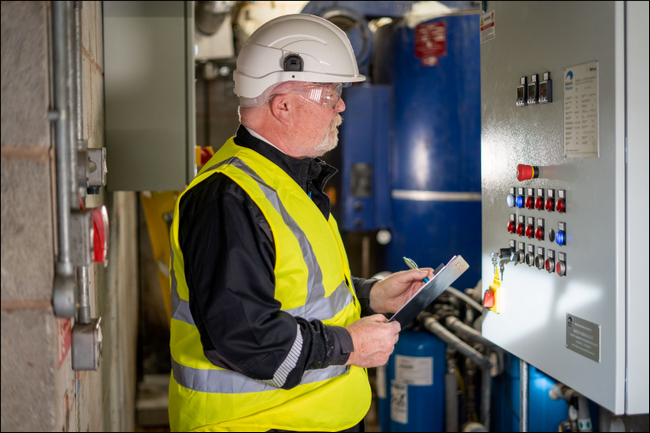
Equipment needs
Over time, parts of the heat transfer system will begin to wear, reducing overall efficiency. While manufacturers might concentrate on proactively maintaining core components of the system, they should also prepare for when that part breaks down. Unplanned downtime stops production and increases operational costs, so manufacturers should have spare parts on site to reduce any production losses. Keeping critical spares on site, such as pump cartridges, parts for the heater or burner and spare fluid for topping up the system, can be integral to maintaining production.
Signage
To remain compliant with health and safety regulations and pass safety audits, manufacturers must have clear signage across the facility about safety procedures. Labelling flammable and high voltage areas and other hazards is important when using heat transfer oils.
Facilities managers can also introduce signage across the facility to improve maintenance procedures. Correctly labelling fluid ensures that old and new fluids are not confused when topping up the system — adding old fluid into a new barrel will result in more waste. Manufacturers should also add signage to the system indicating the direction of oil flow.
In an emergency
We all know the saying “fail to prepare, prepare to fail”. Despite this, we often find that manufacturers have not adequately prepared for some emergency scenarios. While risk assessments may outline the probability of some of these issues occurring, facilities managers and health and safety managers should consider how they can better prepare for serious issues and ensure they are aware of who is best to call in each potential scenario.
Manufacturers should ask themselves what they would do if certain scenarios occur, such as the fluid going off low level, the heater stopping or the pump failing. Most importantly, manufacturers should consider how the facility would respond to major incidents. Having this plan in place is critical to protecting staff and reducing damage. Similarly, management teams must consider how to stop production quickly when issues occur. While many facilities have an emergency stop button, it is often located on or near the system. Placing the button far away from the system, in another room, by the door or by an exit, means that engineers can safely cease production while evacuating.
Storage
Where do you keep your thermal oil? To save on space, manufacturers can store oil outside, but leaving barrels to the elements can negatively impact the quality of the oil. For example, if rainwater sits on top of barrels or intermediate bulk containers (IBCs) and then the air temperature heats up, the barrel or IBC expands. Once it cools down, the container contracts, syphoning water from the top, rendering the new oil as unusable, even if completely capped and sealed.
Similarly, when replacing oil, manufacturers should take care to clearly label waste oil and new oil, keeping them separate in the facility. Mislabelling could cause problems further down the line, such as topping up a system with old waste oil.
Making improvements
Investing time and effort in preventative maintenance can improve site safety, increase productivity and reduce costs for manufacturers. Educating staff, both existing and new, on the importance of safety measures such as signage and housekeeping, as well as best practices like good oil storage and emergency planning, is integral part to heat transfer maintenance. Taking these steps is integral to regulatory compliance. For example, to comply with UKEX (formally known as ATEX 137) Regulations, manufacturers must follow best practice to ensure the safety of the site, monitor fluid to manage risk and train staff to effectively operate and maintain the system.
Just like a cluttered office can cause stress and reduce a team member’s ability to concentrate, a disorganised manufacturing facility can negatively impact machine performance. By including facility checks in proactive maintenance, facilities managers can extend the lifespan of their heat transfer system and better prepare for incidents that could lead to health and safety risks or costly downtime.
For more advice on heat transfer fluid and system management, contact thermal fluid supplier Global Heat Transfer by visiting www.globalhtf.com/contact.
About Global Heat Transfer: Global Heat Transfer is a thermal fluid specialist, providing heat transfer engineering assistance and thermal fluid supplies. Services offered include sampling and analysis, 24 hour delivery of premium quality thermal fluids, system drain down / cleaning / waste management, planned maintenance programs and a broad portfolio of affiliated system design and installation services. It is part of the Global Group of companies.
AMADA WELD TECH INC Highlights AC Inverter Welding Power Supplies
AC inverters provide better control compared to standard AC welders
AMADA WELD TECH Inc., a leading manufacturer of resistance welding, laser welding, marking, cutting, and micromachining equipment and systems, highlights its MIB-300A and MIB-600A AC Inverter Welding Power Supplies which offer increased control resulting in more exact heat input and better quality welds as compared to traditional AC weld controls.
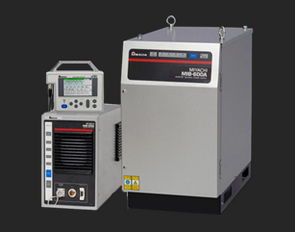 The AC inverter uses inverter technology with pulse width modulation (PWM) to produce and simulate an AC waveform. Unlike AC welders that use line frequency and depend on well-regulated facility power, the AC inverter can produce an AC frequency from 50 Hz to 500 Hz allowing more precise energy delivery in less time, is not affected by line voltage fluctuation, and provides a balanced three phase load.
The AC inverter uses inverter technology with pulse width modulation (PWM) to produce and simulate an AC waveform. Unlike AC welders that use line frequency and depend on well-regulated facility power, the AC inverter can produce an AC frequency from 50 Hz to 500 Hz allowing more precise energy delivery in less time, is not affected by line voltage fluctuation, and provides a balanced three phase load.
The MIB-300A and MIB-600A feature secondary constant current control, up to 20 pulses per weld and the ability to set upslope, downslope and weld interrupt. Up and downslope improve energy input into the welded material and interrupt stops the flow of current if displacement breaches a set level, preventing over welding.
MIB-300A and MIB-600A may be used with the same transformers and weld heads as standard AC welders. With max output currents of 20,000 and 40,000 A respectively, the units may be used for a variety of different welding applications. Common uses for AC inverters include sheet metal welding, wire compacting, and brazing.
About AMADA WELD TECH
Since 1948, AMADA WELD TECH has worked to achieve one goal: to solve customer’s manufacturing challenges. Knowing there is no one solution that fits all, the company strives to provide customers with innovative and reliable manufacturing technology solutions in an effort to be their single source provider. AMADA WELD TECH manufactures equipment and systems for resistance welding, laser welding, laser marking, laser cutting, hermetic sealing and hot bar reflow soldering and bonding. The company serves a wide range of markets including medical devices, battery, aerospace, automotive and electronic components. AMADA WELD TECH is an ISO9001 certified company. Contact AMADA WELD TECH at This email address is being protected from spambots. You need JavaScript enabled to view it.. Learn more about the company’s products and services at www.amadaweldtech.com.
